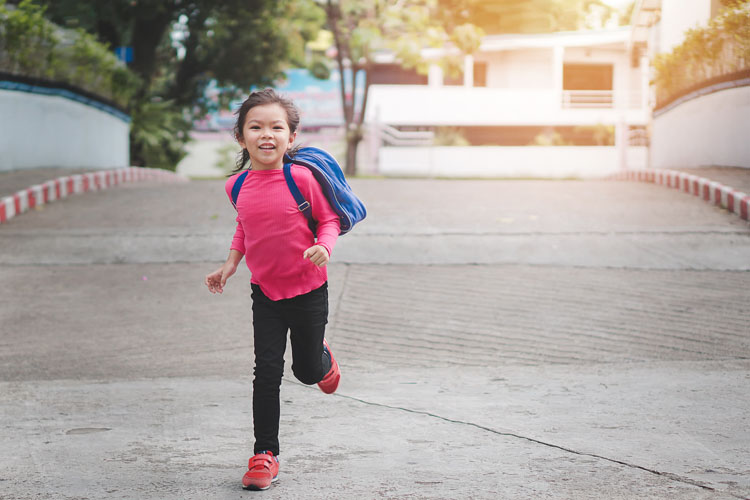Starting school could be an exciting time for children to learn new things and make new friends. However, it could also be an unusually anxious period, especially if they are starting in a new school or class. Here are a few tips from our teachers at SPD Ability Centre to help parents prepare their child for a new school year.
1. Start Counting Down
To ensure that your child knows school is starting soon, start talking about the upcoming school year about two to three weeks prior and counting down to the first day of school. Use a countdown sheet or mark the days off a calendar, or you could also make a visual schedule to aid your child in anticipating the new school year ahead.
2. Involve Your Child in Buying School Supplies and Packing Their Bag
Take your child with you when shopping for school supplies, such as school bag, water bottle or snack box, so that they could be part of the process in choosing the items needed or like and be mentally prepared to get ready to start school.
Get your child to pack their bag together with you. Guide your child in packing the essentials, such as water bottle, snack box and extra set of clothes and/or diapers. This will aid them in the pre-school or EIPIC centre where they are required to take and keep their belongings by themselves.

3. Set a Back-to-School Sleep Schedule
Start your child on a back-to-school sleep schedule a few weeks before school starts. Put them to bed at the time you want them to sleep on a school day so that they could get used to the sleep schedule. You can make gradual adjustments to bring the sleep time 15 minutes earlier each day if your child sleeps late during the school holiday.
4. Practise the Back-to-School Routine Beforehand
Conduct practice runs before the first day of school where you wake your child up at the stipulated time, and your child gets ready, takes breakfast and prepares to leave the house like it is a school day. This could help reduce some anxiety and nervousness as your child would know what to expect on the first day.
In addition, you could also use visuals and social stories to talk to your child about the school routine. A visual schedule could be used to display school day routine, such as waking up, washing up, having breakfast, leaving for school, saying goodbye to parents, etc. Social stories could be used to talk about school expectations like class rules – keeping quiet when the teacher is talking, raising your hands when you wish to talk, hands on lap and feet on ground, etc.
Try role playing with your child on how a typical school day would be like and the things that they would do in school. Practise saying goodbye to your child during the role play to let your child understand that on actual day of school, parents would drop them off and return to pick them up when school ends.
5. Familiarise Your Child with Transportation and Recess Plans
Once you have planned how your child would travel to and from school, go through the routine with them so that they know what to anticipate. Select the safest route for your child and commute together for a few times. Create a visual guide (for e.g., personalised road map with a scrap book) with photos of landmarks your child could take note, counting how many bus stops your child has to note before the actual stop.
Find out what food is available in the school canteen, and take note of what your child would typically buy. Knowing how much a meal cost would give you an idea of how much pocket money to give. Familiarise them with the recess timings, bell ringing and buying food so that they know what to do and not feel lost or confused. Getting your child to buy food from hawker stalls is one way of helping your child familiarise with ordering and transaction of money.
6. Familiarise Your Child with the School Environment
If your child is starting in a new school, attending orientations or tour of the school compound before school begins will make the school environment less intimidating. Familiarising with school surroundings could make your child feel safe and more comfortable in a new environment.
Apart from going on a tour of the school, it helps also by showing your child photographs of the school and the surroundings as you talk about starting school.

7. Keep Your Language about School Positive
Keeping the language around school positive and comforting in front of your child will reassure them of the events to come. Children pick up on parents’ mood and expectations and by being positive and excited about starting school, it could help your child anticipate school in a positive manner. If you have concerns about your child not being able to transit well, it is best not to discuss it when your child is around, as it may affect their confidence of school.
8. Touch Base with Teachers and Therapists
If possible, set up a time to meet with teachers, allied educators and therapists about the learning accommodation that your child requires, so as to ensure that everyone who is supporting your child is one the same page.
Acclimatise your child to the events ahead so as to ensure a successful start of the school year!
References:
- 11 Back-to-School Tips for Parents of Children with Special Needs, Lisa Jo Rudy, 19 October 2019
- 11 School Tips for Kids with Special Needs, Emily Starbuck Gerson, 28 August 2019
- Back to School Tips for Parents of Children with Special Needs, Amy Kelly, 26 August 2019
- Back-to-School Tips for Students with Special Needs, Ilana Danneman, 21 August 2017





